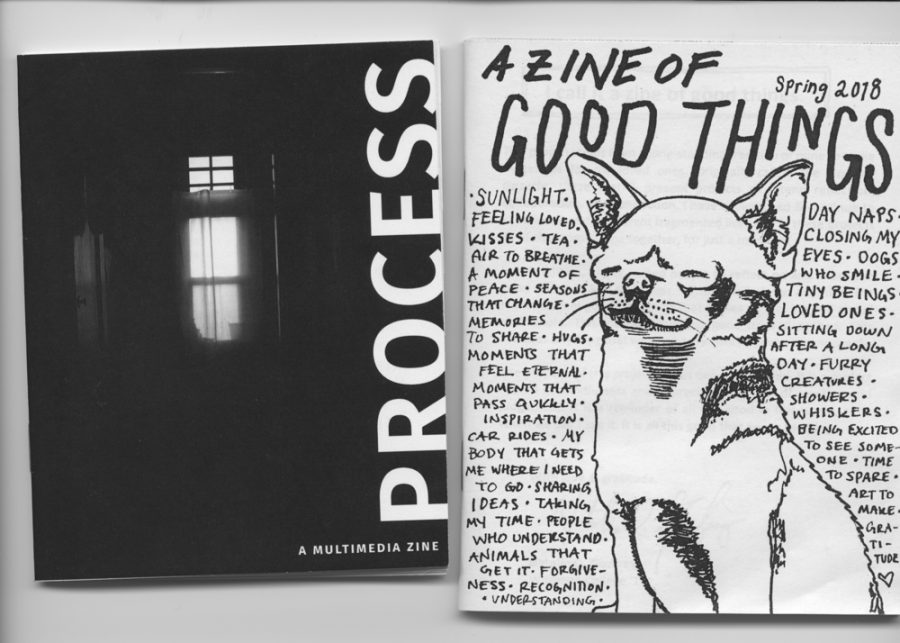Zines at Whitman
April 12, 2018
From art to prose, recipes to photography, and lists to quotes, zines have got it all. Since their resurgence in the 1970s stemming from punk culture, zines, which are small, low-budget publications—the countercultural cousin of the magazine—are a popular mode of expression, whether they aim to get a message out there or to just have fun. Various Whitman students have been making zines on campus throughout the years, with the content and format varying widely; in short, the possibilities are endless.
Natalie Godfrey ’18, a zine maker and collector, explained the appeal of zines.
“Usually these [zines] will be cheap, low-quality, get it out and get it to a lot of people, so I think it’s really accessible in that way for not only people who want to get their voice out, but also people who want to hear about other stuff [from zines],” Godfrey said.
Godfrey’s most recent zine is called “A Zine of Good Things,” which is centered around the idea of gratitude. She asked 110 people to submit lists of good things and compiled them together.
“A lot of zines that I’m interested in are either some sort of information zine, like you’re explaining a concept to someone—I’ve done one on mindfulness—or a political edge, or a how-to guide, which is kind of the ones I’ve been interested in,” Godfrey said. “I think a lot of mine come out of mindfulness and wanting to just engage people in any sort of mindfulness practice.”
Zines can come in many different forms with different intents behind them. Devon Yee’s ’18 zine, “A Brief & Incomplete Recent History of Racism & Activism at Whitman,” leaned towards the political side. This zine, that gave a timeline of various racist acts, the activism reacting to that and the subsequent change achieved, stemmed from a frustration with inaccuracies in the story of how the Power and Privilege Symposium was started. Yee noticed that the often-repeated story was that the college decided to give the day off, that erases the work students and faculty have done to start the symposium.
“The reason I made this zine is to honor and acknowledge the work of students of color, especially women of color and non-binary folks of color, and to have that history be known,” Yee said. “In the writing of it, I could really see how student action has driven change on campus … Another thing is of course that as a first year I was really frustrated to hear some of my white friends in my section be like, ‘oh, well these issues don’t really affect me’… and the thing I feel that people often forget is that racism is very much alive and it is very much here and white people are very much implicated in racism, but just kind of not acknowledging their position in all these things, and so it’s [the zine is] also kind of a ‘look, this is here, this exists, and this is what actions students have taken to combat racism.’”
Yee distributed her zine widely, placing copies in the library, Reid and the residence halls before the 2018 Power and Privilege Symposium, ensuring that the word was spread.
While Yee’s zine was created for a specific, one-time purpose, zines can also be ongoing. Zuhra Amini’s ‘18 zine “Process” is an annually published zine, now on its second edition, that aims at creating change as well as a community. The zine is put together by people of color and all submissions come from people of color. Amini explained the premise of the zine.
“‘Process’ is a multimedia zine that focuses on the theme of being in the process of,” Amini said. “It’s about realizing the importance of going through things and not just the end goal.”
Amini sees the zine as not only a publication, but also as a community space for people of color to create art.
“To me, ‘Process’ as a zine is the publication, but I also think of ‘Process’ as a collective as well, and I’m hoping that it grows more to be a collective in the coming years,” Amini said. “It’s been a really important space to have with other students of color who are also doing art, and just encouraging each other and pushing each other to create art, giving feedback about art, critiquing it, it’s just been really productive to have that space because and that’s what I felt like was lacking before I made ‘Process.’”
Zines can also just be a great way to have fun and collect memories. Senior Lucy Skugstad is in the process of putting together her first zine, “Bomb.” The zine will include submissions from their friends and classmates, with content ranging from collages to cocktail recipes. As a senior, she wanted to have an achievement like this zine to look back on.
“It was kind of an opportunity to make a capstone Whitman experience, something with all of our friends in it.”
Skugstad emphasized the opportunity to exercise creativity that making this zine gives people.
“[It’s exciting] seeing that people are putting some effort into it and expressing something that they’re probably thinking about, but considering school and stuff, they don’t really see a reason to work creatively in whatever medium they like to do,” Skugstad said. “So I know this kind of instigates someone to think about, ‘oh, I’ve been wanting to do some more writing outside of class, like it would be awesome if I could do it for something.’”
Whether they aim to make change or to just have fun, zines remain a creative mode of expression for students at Whitman.






